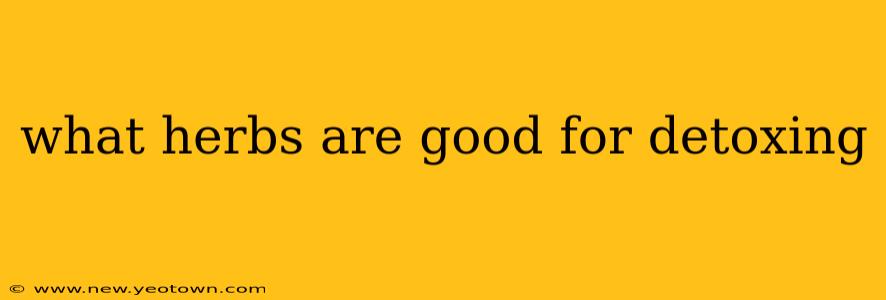What Herbs Are Good for Detoxing? A Journey Through Nature's Cleansing Power
The human body is a remarkable machine, constantly working to eliminate waste and toxins. While our livers and kidneys do the heavy lifting, many believe certain herbs can gently support this natural detoxification process. But before we dive into the specifics, it's crucial to understand that "detox" is a broad term, and no herb can replace a healthy lifestyle. These herbs are best viewed as supportive allies, not miracle cures.
Think of it like this: your body is a garden. Sometimes, it needs a little help weeding out the unwanted growth. These herbs are like the gentle gardener, aiding your body's natural cleansing mechanisms.
What does "detoxing" actually mean?
This is a question many ask, and it's a crucial starting point. "Detox" doesn't refer to a single process; it's a collective term for your body's natural ability to eliminate waste products and toxins. This involves your liver, kidneys, skin, and intestines working together. While some commercial "detox" products make extravagant claims, the truth is that your body is already incredibly efficient at this. These herbs can help support this natural process, not replace it.
What are some herbs that support liver health?
The liver is the primary detox organ, so supporting its function is key. Several herbs have traditionally been used for this purpose:
-
Milk Thistle: This powerful herb is renowned for its protective effects on the liver. It contains silymarin, a compound believed to help regenerate liver cells and protect them from damage. It's often used to support liver health in individuals facing challenges like alcohol-related liver disease or exposure to toxins.
-
Dandelion Root: More than just a pesky weed in your garden, dandelion root is a gentle liver tonic. It's believed to stimulate bile production, aiding in the elimination of waste products. The bitter compounds in dandelion root also contribute to its digestive benefits.
-
Burdock Root: This root vegetable has been used for centuries as a blood purifier, supporting liver and kidney function. It’s considered a diuretic, helping to flush out toxins through urine.
Which herbs are known to support kidney function?
The kidneys are equally important in the detoxification process. Here are a few herbs that traditionally support kidney health:
-
Uva Ursi: This herb has been used for centuries as a urinary antiseptic, helping to support kidney health and urinary tract function. It's important to note that it should only be used under the guidance of a healthcare professional.
-
Corn Silk: The silky strands inside corn cobs are surprisingly beneficial. They're known for their diuretic properties and ability to gently support kidney function.
Are there herbs that support overall detoxification?
Several herbs work more generally, supporting the body's overall detoxification pathways:
-
Turmeric: Famous for its anti-inflammatory properties, turmeric also boasts antioxidant benefits, supporting the body's natural ability to combat oxidative stress.
-
Ginger: This pungent root is known for its digestive and anti-inflammatory benefits, which can indirectly contribute to improved detoxification.
What are the potential side effects of using these herbs?
While generally safe when used appropriately, these herbs can cause side effects in some individuals. Always consult a healthcare professional before using herbal remedies, especially if you have pre-existing health conditions or are taking other medications. Some herbs can interact negatively with certain drugs.
Can herbs replace a healthy lifestyle for detox?
No, herbs cannot replace a healthy lifestyle. A balanced diet rich in fruits, vegetables, and whole grains, regular exercise, adequate hydration, and stress management are far more impactful than any single herb. Think of these herbs as supplemental support for your body's natural detoxification processes, not a shortcut to wellness.
This exploration into the world of detoxifying herbs is just a starting point. Remember, every body is unique, and what works for one person may not work for another. Always consult a healthcare professional or qualified herbalist for personalized advice before incorporating herbs into your health routine. They can help you determine which herbs are appropriate for your individual needs and ensure safe and effective usage.

